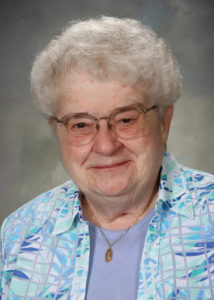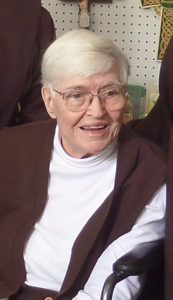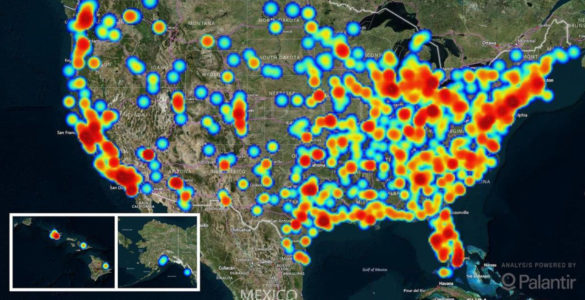JACKSON – The death of Cardinal Bernard F. Law on Dec. 20, at the age of 86, brought forth a range of conflicting reactions and emotions in the Diocese of Jackson and around the world. Cardinal Law began his priestly ministry in this diocese and was well known here for his fervent support of the Civil Rights Movement, social justice and pro-life issues. He was most famous, however, as the face of the Church’s sex abuse scandal after he became archbishop of the Archdiocese of Boston.
Cardinal Sean P. O’Malley of Boston said in a statement Dec. 20, “As archbishop of Boston, Cardinal Law served at a time when the church failed seriously in its responsibilities to provide pastoral care for her people, and with tragic outcomes failed to care for the children of our parish communities.”
Cardinal O’Malley also recognized that his predecessor’s death “brings forth a wide range of emotions on the part of many people. I am particularly cognizant of all who experienced the trauma of sexual abuse by clergy, whose lives were so seriously impacted by those crimes, and their families and loved ones. To those men and women, I offer my sincere apologies for the harm they suffered, my continued prayers and my promise that the archdiocese will support them in their effort to achieve healing.”
Cardinal Law was buried in Rome, where he had his last assignment.
Bernard Francis Law was born on Nov. 4, 1931, in Torreon, Mexico, where his father, a career Air Force officer, was then stationed. He attended schools in New York, Florida, Georgia, Barranquilla, Colombia, and the Virgin Islands.
He graduated from Harvard University in Cambridge, Mass. before entering St. Joseph Seminary in St. Benedict, La. in 1953. He later studied at the Pontifical College Josephinum in Worthington, Ohio.
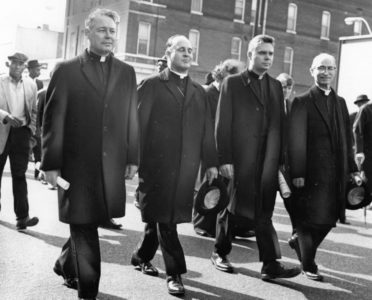
Cardinal Bernard F. Law, second from right, is pictured during a 1969 march to the Lorraine Hotel in Memphis, Tenn., for a memorial service for the Rev. Martin Luther King Jr. Cardinal Law, who had been one of the United States’ most powerful and respected bishops until his legacy was blemished by the devastating sexual abuse of minors by priests in his Archdiocese of Boston, died early Dec. 20 in Rome at the age of 86. (CNS file photo)
Bernard F. Law was ordained a priest of the Diocese of Natchez-Jackson (now Jackson) in 1961. His first assignment was as associate pastor at Vicksburg St. Paul Parish from 1961-1963. In January 1963 he was appointed associate pastor of Jackson St. Therese Parish and in March became the editor and business manager of the diocesan newspaper, then The Mississippi Register. At the same time, he held several other diocesan posts, including director of the family life bureau and spiritual director at the minor seminary.
A civil rights activist, he joined the Mississippi Leadership Conference and Mississippi Human Relations Council. He received death threats for his strong editorial positions on civil rights in The Mississippi Register.
His work for ecumenism in the Deep South in the 1960s received national attention, and in 1968 he was tapped for his first national post, executive director of the U.S. bishops’ Secretariat for Ecumenical and Interreligious Affairs.
In 1973, Blessed Paul VI named him bishop of Springfield-Cape Girardeau, Mo. He made headlines in 1975 when, amid an influx of Vietnamese refugees arriving in the United States, he arranged to resettle in his diocese all 166 refugee members of the Vietnamese religious order, Congregation of the Mother Co-Redemptrix.
Continuing his ecumenical work, he formed the Missouri Christian Leadership Conference. He was made a member of the Vatican’s Secretariat (now Pontifical Council) for Promoting Christian Unity and served in 1976-81 as a consultor to its Commission for Religious Relations with the Jews. He also chaired the U.S. bishops’ Committee on Ecumenical and Interreligious Affairs in the late 1970s.
St. John Paul II made him archbishop of Boston in January 1984 and the following year made him a cardinal.
A constant advocate of the right to life of the unborn, he denounced the pro-abortion stance of the Democratic vice presidential candidate, Geraldine Ferraro, a Catholic, during the 1984 presidential race.
It was his proposal for a worldwide catechism, in a speech at the 1985 extraordinary Synod of Bishops, that led to development of the “Catechism of the Catholic Church.” Cardinal Law also oversaw the first drafting of an English translation of the catechism, and unsuccessfully defended the inclusive-language version that the Vatican ultimately rejected and ordered rewritten.
The collapse of Cardinal Law’s authority and status began in January 2002 with the criminal trial of serial child molester John Geoghan and the court-ordered release of archdiocesan files on Geoghan to the media. Geoghan had been allowed to stay in active ministry for three decades before he was finally removed and subsequently laicized.
The released files showed that when complaints against Geoghan were made in one parish he would be removed, but soon assigned to another parish. The files gave firsthand proof of how such complaints were handled and demonstrated a pattern of protecting and transferring abusive priests by the cardinal and his aides.
In the first weeks following the revelations, Cardinal Law publicly apologized on several occasions and announced a series of major policy changes – most importantly, permanently removing from ministry any priest ever credibly accused of sexual abuse and turning over to district attorneys the names of all priests against whom any abuse allegation had been made.
A series of investigative reports by the Boston Globe made national headlines, and other newspapers and television news teams across the nation began investigating how their local dioceses dealt with abusive priests.
Mary Woodward, diocesan chancellor and long-time friend, remarked Cardinal Law had the ability to listen to and understand people from all walks of life. “He had an immense vocabulary and keen intellect that he used to decipher and diffuse often difficult situations,” Woodward said.
“Though his time in Boston became marred by some bad decisions and oversight, he was still a pastor at heart trying to heal and reconcile until his resignation and even beyond that. There were times when he would sneak out of his residence late at night and visit the sick in nearby hospitals. He genuinely cared about each person and I know he grieved over the immense pain endured by victims of sexual abuse at the hands of church personnel,” she added.
St. John Paul II appointed Cardinal Law in 2004 to be the new archpriest of the Basilica of St. Mary Major, one of the four major basilicas of Rome.
(Contributing to this story were Mary Woodward, chancellor for the Diocese of Jackson and Catholic News Service reporters Cindy Wooden and Junno Arocho Esteves in Rome.)

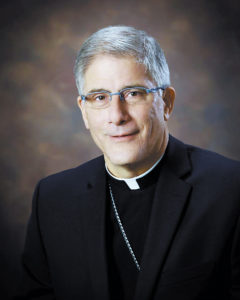

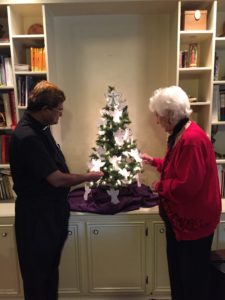 YAZOO CITY – Father Paneer Arockiam, pastor of St. Mary Parish and Vay McGraw place the last angels on the parish angel tree. McGraw read about the angel tree in Mississippi Catholic in 2016 and wanted to bring the tradition to her own parish for 2017. (Photo by Diane Melton)
YAZOO CITY – Father Paneer Arockiam, pastor of St. Mary Parish and Vay McGraw place the last angels on the parish angel tree. McGraw read about the angel tree in Mississippi Catholic in 2016 and wanted to bring the tradition to her own parish for 2017. (Photo by Diane Melton)